

China hints at ending birth limits in northeastern region — but most people hate the idea. China’s Two-Child Policy, Five Years On. Single and Proud: China’s Millennials Embrace a Solo Lifestyle. At Beijing’s trendiest new noodle joint, human interaction is off the menu.
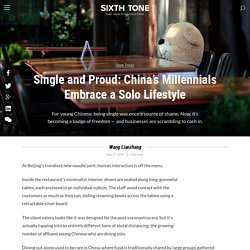
Inside the restaurant’s minimalist interior, diners are seated along long, gunmetal tables, each enclosed in an individual cubicle. The staff avoid contact with the customers as much as they can, sliding steaming bowls across the tables using a retractable silver board. The silent eatery looks like it was designed for the post-coronavirus era, but it’s actually tapping into an entirely different form of social distancing: the growing number of affluent young Chinese who are dining solo. Dining out alone used to be rare in China, where food is traditionally shared by large groups gathered around a circular table. But these attitudes are softening as millennials embrace the single lifestyle.
It’ll take time for most Chinese to accept the idea of eating alone. - Sun Yun, restaurant owner Previously, many Chinese graduates would settle down soon after college, living in the family home until they got married. What a Picture of China’s One-Child Policy Leaves Out. Brainwashed?
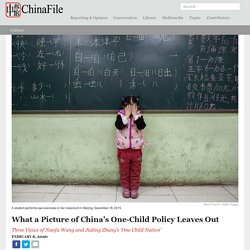
Reflections on Propaganda in One Child NationBy Jie Li One Child Nation, a documentary distributed by Amazon Studios which was shortlisted for an Academy Award, is becoming one of the most influential films about China in the United States. Marketed as “the truth beyond the propaganda,” the film’s opening credits juxtapose luminous jars of aborted and abandoned fetuses against a military parade of robotic marching soldiers.
Equating propaganda with lies, violence, and farce, One Child Nation at once reveals and recycles the logic, power, and aesthetics of propaganda. Why Some Rural Families Have Stopped Trying for Sons. In 1985, five years after the implementation of a nationwide one-child policy, a couple from a village in northeastern China decided to try for a son.
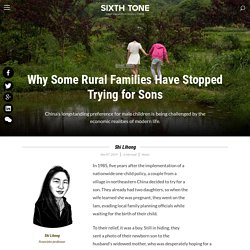
They already had two daughters, so when the wife learned she was pregnant, they went on the lam, evading local family planning officials while waiting for the birth of their child. To their relief, it was a boy. Still in hiding, they sent a photo of their newborn son to the husband’s widowed mother, who was desperately hoping for a grandson to continue the family line. Despite photographic evidence, the woman did not believe the news until another nine months later, when the couple paid a hefty fine and returned home, infant son in tow. The moment they arrived, the grandmother placed the baby down and unwrapped his swaddling clothes.
A year later, a very different story took place in a neighboring village. Historically, the Chinese family ideal has included multiple children and at least one son. Horrors of one-child policy leave deep scars in Chinese society. BEIJING — His wife was seven months pregnant with their second child when the group of people barged into his home and took her away.
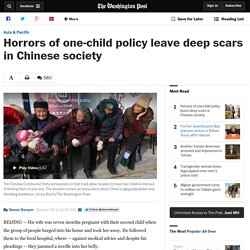
He followed them to the local hospital, where — against medical advice and despite his pleadings — they jammed a needle into her belly. “They grabbed my wife’s body like they were grabbing a pig, four or five people holding her hands and legs and head, and injected a shot into her belly,” the man said, asking not to be named for fear of retribution. “Neither my wife nor I signed any consent form.” [The human suffering caused by China’s one-child policy] Ten hours later, she gave birth to a boy, wriggling and faintly crying.
The incident happened not during the horrors of some Mao Zedong-inspired mania in the 1950s or 1960s, but in 2011, in the Internet age and when China was walking proudly on the global stage as a major power. On Thursday, China’s Communist Party announced it was abandoning its unpopular one-child policy after 35 years. Read more: In China and India, men outnumber women on a massive scale. The consequences are far-reaching. - Washington Post. The People’s Daily: ‘Giving birth is not only a family matter but also a national issue’ “When you don’t want children, you force people to get sterilized.
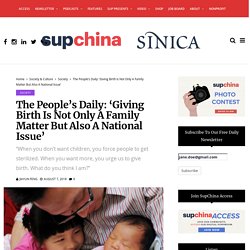
When you want more, you urge us to give birth. What do you think I am?” A backlash is growing on Chinese social media against a recent commentary by the People’s Daily, which asserts that as China grapples with its falling birth rate, having children “is not only a family matter but also a national issue.” Published by the People’s Daily’s foreign edition on August 6, the article (in Chinese) first acknowledges the public’s resistance to the idea of having more children despite a set of policies aimed at boosting China’s fertility rate. “The cost of raising a kid is particularly high for parents living in the cities. The heavy financial burdens of having a child, however, as Zhang argues, should be taken up by Chinese families, given that China is facing a looming demographic crisis as a result of the country’s decline in childbirth and growing elderly population.
“Having kids has a special meaning for Chinese people.